 Užmirštos karalystės pasakos
Užmirštos karalystės pasakos
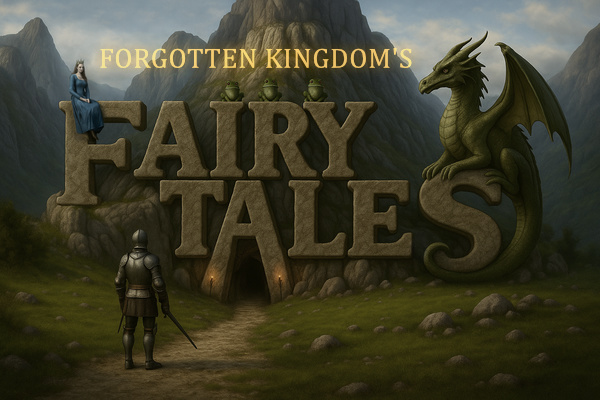
Forgotten Kingdom's Fairy Tales
Human tales, translated from Lithuanian, with illustrations and music made by thinking machines.
Labai senai teko dirbti pagalbininku Gedimino pilies atstatymo darbuose Vilniuje. Kartą darbininkai tvarkė pamatus ir netyčia įvirto į kažkokį tunelį. Jame stovėjo dideli indai su auksinėmis monetomis, papuošalais ir kažkokiais užrašais. Kilo vietinės reikšmės sujudimas ir pasitarimas, ką daryti. Galiausiai visi nutarė, kad jeigu pasakysime vadovybei, tie sustabdys darbus, pradės visokius tyrimus ir atlyginimai išgaruos, kaip kaimiečio dešra iš rūkelnyčios, apsilankius kalėdoti klebonui. Neliko nieko kito, kaip radybas išsidalinti tarpusavyje. Buvau laikinas darbuotojas ir man nieko nedavė, tai iškėliau klausimą, kad gal reikia visiems apie tai papasakoti. Kilo dar vienas pasitarimas, kurio metu darbininkai ėmė pergyventi, kad statybose labai pavojinga ir nukritęs nuo pastolių aš galiu nusisukti galvą ir jiems teks mane užkasti ir užbetonuoti tunelyje. Finale susitarėme, kad jie man atiduos raštus ir toliau to klausimo nesvarstysime. Žemiau biologinės substancijos pasakos iš po bokšto, iliustracijas kliedėjo sintetinis išmislas.
The Boy and the Frog Princess
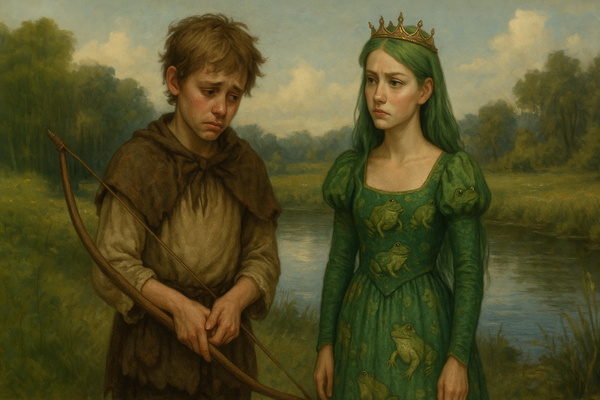
Once there lived a boy. Every summer, his parents would bring him from the city to the village and leave him with his grandparents. In that village there was a huge pond, and the grandparents, fearing the boy might drown, often frightened him:
— Just don’t go near the pond, grandson. In its mud lives a very big frog. She’ll catch you and pull you in. So you’ll vanish, never having seen life.
The boy grew and over time became stronger. Influenced by such anti-frog propaganda, he hated frogs more and more. A bit later he got braver and set out to beat them with a long stick. That summer, dozens of croakers were ambushed along the shores and met their end, but the big one still didn’t come out to fight. The boy concluded that to lure out the big frog, he’d have to kill even more members of her gang. But it got harder and harder. Frogs started dodging the stick, and later would dive and flee at the mere sight of their reaper. Then the boy crafted a bow from the hardest walnut wood and some strings and began shooting with it. Over several summers, he slaughtered terrifying multitudes of frogs, but the big frog still didn’t come out to face him.
One successful hunting evening, just as the boy was about to head home and was gathering up his arrows along the shore, next to one of them a frog jumped onto a leaf and spoke in a human voice:
— Hello, boy. I am the frogincess, and you've been caught now, firing arrows in every direction without any responsibility. You will now be my husband.
The boy was very surprised to see a talking frog and replied that he didn’t know anything and had only come to pick up a lost arrow. Then out of the swamp rose 12 large frogs, each the size of a big ox. In their hands they held huge thudding reed clubs and declared threateningly in unison:
— We are 12 brothers of the frogincess, the froginces. If you do not marry our sister, you will insult her, and for that we will split your skull like a watermelon and break your legs like corn sticks.
The boy was terrified and, falling to his knees, began to beg for mercy. The froginces listened to him and decided not to kill him right away, but instead to bring him before their father, the king, to sort situation out.
At the palace, they recounted the events — how the arrow landed near the princess and how, according to ancient traditions, that meant she would be his wife. The boy didn’t want to marry, because his grandfather had told him it was hell, so crying and humbled, he crawled around the king’s paws for about an hour, promising to catch a cartload of flies and mosquitoes if only they’d let him go. At last, the frog king relented and said:
— Fine, you may go free. In return, each summer we want a sack of flies and a few litres of blood for our mosquito farm. If you keep shooting arrows, you must tie whistles to them, so my other daughters can hear them coming from afar and step aside to avoid production injuries from the fate whistling down from the sky. One daughter is enough for you. When you turn 30, then we’ll hold the wedding. You must come visit me on a diplomatic mission, having by then become very wealthy and influential. For now, you’re just a little snot-nosed beggar, unworthy of my daughter.
What else could he do? The boy agreed, for he saw how the princess’s brothers, standing in the corner of the hall with glowing eyes, were already polishing their metal clubs and hammering nails into the wooden ones, imagining the moment of impending justice. The rest of the summer he spent only chasing and catching flies and mosquitoes, and in the following summers regularly donated blood.
When the boy turned 18, the king allowed him to kiss his future wife — the frog — and she transformed into the most beautiful fairy-tale princess the boy could ever imagine. From that moment, the boy, now a handsome youth, truly desired to marry her. By the time he turned 30, the young man had become the richest and most influential person in the human kingdom. And so came the day to go to the frog king for the wedding.
A great banquet was prepared in the palace. The tables were loaded with the tastiest flies, mosquitoes, and worms. For the groom and the princess, a feast suitable for humans was laid out, local and from distant lands. After dancing and singing, in the evening, the princess said to him:
— It will soon be midnight. Go, prepare and warm the bed, and I’ll come shortly.
The happy groom dashed off like lightning to the bedroom, undressed completely, crawled under the covers and began waiting for a night sweet as honey. As soon as the clock struck twelve, into the room burst the princess and her 12 frogince brothers with large clubs studded with nails. They dragged him out by his arms and legs, slammed him onto the ground, broke his spine, knocked out his teeth, and shattered all his bones. As the light dimmed in his eyes, the boy heard the angry voice of the princess:
— What, you thought no one would know or remember?! You killed hundreds of my brothers and sisters and still expected I would marry you, suck with you at nights, and roll with you in bed? Why do you think we drained your blood every summer?! So that you, frog-basher snot, wouldn’t have the strength to go on killing frogs. Everything you’ve gained and achieved in your life will now come to me and go to a fund to support the victims of your crimes! — And she pierced his heart with the very arrow he once hunted her with.
And the moral of the tale... frog revenge is cold and calculated — just like their blood. Don’t smash frogs, children.
How the Baltic Sea Came to Be
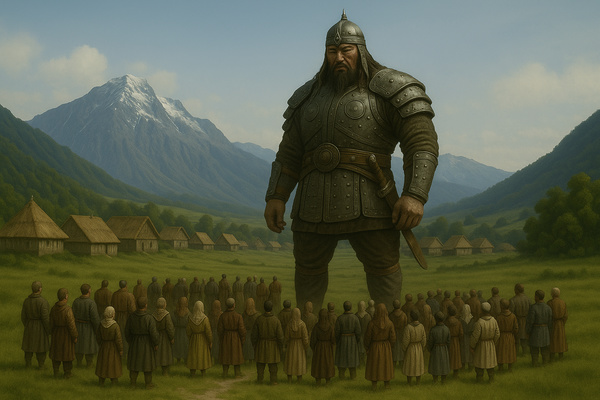
Once, where now the Baltic Sea waves, there were enormous mountains, and atop their peak lived a massive giant, Tamerlanopithecus, who had wandered in from who-knows-where. In the valleys of those mountains, where now is Lithuania, among forests and fields, lived the ancient Lithuanians. And they would have lived without trouble, if not for that mountain tick.
Tamerlanopithecus would descend to the Lithuanians once a year and demand a hundred sacks of Lithuanian maidens, six carts of black bread, and five smoked skilandis sausages. If he didn’t get them, he would tear off house roofs, dig up the ground, and catch as many as he needed himself. Then he’d stomp back to the mountains, where he crunched on them like sunflower seeds until the next time. From the ravines came only terrifying screams.
The Lithuanians endured for a long time. They thought maybe the guest didn’t understand the local customs, but things were clearly not going well with that beast. They pitied both the girls and the skilandis sausages.
Finally, after pondering a plan to resolve everything, they said to him:
— You, Tamerlanopithecus, go east. There’s a fairy-tale land called Maskolia. In its forests, you’ll find many ripe maidens, covered in cotton candy. They climb trees, just pick them like berries and eat.
The giant, drooling with saliva, ran off. But he didn’t like the local berries, because it wasn’t cotton candy, but coarse hair, which stuck between his teeth, and it was very hard to catch them in the trees, like lice in a beard. The giant got terribly angry and headed back to Lithuania, to eat Lithuanian girls and beat Lithuanian peasants for having tricked him.
But the Lithuanians hadn’t wasted time. While the giant was chasing the Maskols, they invited the Ukrainians to help, who had a lot of shovels, since they were digging the Black Sea at that time. They began digging a pit down to the centre of the Earth, right where the giant’s mountain sleeping spot lay. Meanwhile, the Lithuanians crafted and set up a hollow straw bed on top of the hole.
The giant returned home, exhausted, hungry, and weak, and the Lithuanians told him:
— Forgive us, we were foolish, didn’t know it would turn out this way. Here, have a quick snack of a hundred pigs and lie down to rest, sleep. We’ve even laid a soft bed for you. Tomorrow morning, hundreds of maidens will be ready for you. You’ll be able to eat them with one hand, and beat us with the other.
Tamerlanopithecus’s heart softened, even a tear rolled down. And he decided to sleep, restore his strength, and mentally prepare for tomorrow’s joys. He fell onto the mountain bed… and fell… and fell… for several days, until he crashed into the Earth’s core, splashed out his brains against it and burned up right there. Then the Ukrainians and Lithuanians buried him, so that not even a whiff remained of the giant. The Ukrainians took part of the dug-up earth as payment to heap up the Carpathian Mountains, and the rest of the hole they filled with water.
By the way, ever since then, the Maskols haven’t really liked the Lithuanians and Ukrainians for sending Tamerlanopithecus to them for a meal.
The Knight and the Three Earthworms
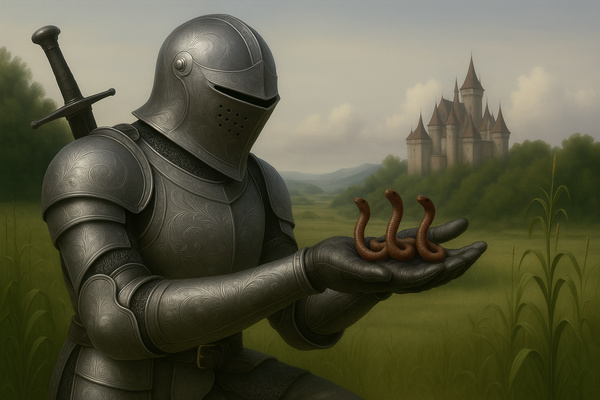
There once was such a kingdom, but one day a dragon flew in and knocked everything over, smashed the pots, broke the king’s crown, grabbed the princess, and flew home. Enclasped by grief, the king announced that whoever rescued the princess would get her hand and half a leg. No one wanted to drag themselves off somewhere into the mountains to fight a dragon, but when the king promised a boob too, one very noble knight appeared and said to the king:
— All right then, I’ll help you, but whatever I find in the dragon’s home will also be mine.
The king rejoiced, and all the kingdom’s peasants sighed in relief, knowing the king would no longer hassle them.
The knight set off to rescue the princess. He walked like that for several days and nights, until his food ran out and hunger enveloped him. Eventually, he reached a large lake. On this occasion, he decided to catch some fish and started turning over the stones and stumps along the shore. He rummaged and thudded for a long time until he found three worms blinded by the light, who hadn't managed to catch up and flee. Just as the knight was about to stick one onto the hook, it spoke in a human voice:
— Noble knight, don’t kill us and don’t skewer us on the hook. We will help you in better ways. Wrap one of us around the hook and cast it into the water.
The knight was a bit surprised to see a talking worm, but then remembered that dragons existed, calmed down a bit and replied:
— All right, but if you try to escape, I’ll kill your friends — and threw the hook with the worm into the water.
In the water, the worm snuggled up to the hook so the fish wouldn’t see it, looked around and began shouting:
— Hey, fish, swim here and fast, or you’ll all get it in the snout!
Shortly thereafter, a carp swam up and said:
— Why are you shouting, not letting me sleep in the mud? I’ll eat you right now, you stupid worm.
The worm looked the carp over, weighed that there wouldn’t be enough meat for the knight and said:
— Get lost. If you try to eat me, the hook will snag your gill, the knight on the shore will pull you out and it’ll be over for you, only bones will remain.
The carp took a closer look — and sure enough, the hook was visible, and a line ran from the hook to the lake’s sky. It thanked the worm and swam off happy to have escaped death. The worm started yelling again. Like so he chased off a few more fish, until a large pike swam up to teach the impudent worm a lesson in lake etiquette. The worm assessed her weight, fatness coefficient, and began insulting the pike:
— What are you staring at, you shriveled swamp herring! Swim closer! I’ll make a rake for you out of your teeth!
The pike became terribly furious and, without even asking why she needed a rake, lunged to swallow him. But he slipped away swiftly. A tug on the line — the knight yanked and pulled the pike to shore. Everyone ate well and continued on their journey.
Late at night, they reached the dragon’s cave with large gates. Blindly sealed cave, no windows anywhere, and the gates were locked. The second worm said to the knight:
— See, there’s a keyhole in the gate and not even a finger fits through. But I can unlock the gate from inside.
The knight said:
— All right then, but if you try to escape, I’ll kill your friends.
— I’m not going anywhere, — replied the worm, — just let me rummage in your bag a bit.
The worm crawled into the knight’s bag filled with all sorts of stuff and pulled out a long piece of wire. He groaned a long time while bending it into some strange curly shape. He inserted it through the keyhole, hooked onto the latch inside, and unlocked the gates. He learned such skills by stealing metal pots, harrows, and other gear from the surrounding villages. The local blacksmith, for a fee, forged from them armor and swords, meant for the spring uprising of the worms against the moles and the fishermen. Later, the peasants, having caught the blacksmith, burned him in his own furnace for that, and the moles covered the lands of his entire kin with holes and mounds.
The knight quietly snuck up to the dragon and slew it while it slept. Soon after, in one of the rooms, he found the princess. But when she heard she’d have to give him her hand, leg, and even a boob, she got stubborn and didn’t want to go home with him. She was already attuned to the dragon’s scale and smaller dimensions didn’t interest her. The knight was disheartened, but the third worm said:
— When the princess is sleeping at night, let me into her room, and leave the rest to me. Come back to the princess in the morning and ask for her hand again.
The knight thought a bit and said:
— All right, but if you try to escape, I’ll kill your friends — and did as the worm asked.
While the princess was sleeping, the worm crawled into her butt, slithered up to her belly, and quietly waited for morning. In the morning, the knight came into the room and again asked the princess nicely to give him her hand along with the other organs. Upon hearing this, the worm began twisting and writhing in her belly. The princess clutched her stomach and thought: “These must be butterflies in my stomach, which is empirical proof that I love him.” Well... and she agreed to give him her hand, leg, and even both boobs.
Since everything turned out very well in the end, the worms said to the knight:
— We helped you, now release us, noble knight. On your way home, don’t forget to stop by the forest near the lake, we’ll celebrate your mission’s successful ending.
The knight released all the worms and ran to the princess.
He still lived with her a few weeks in the castle, grilled dragon shashlik and feasted on various drinks from the dragon’s cellar. But the dragon began to stink, so they decided it was time to pack all the dragon’s gold they could carry and head home. On the way, they also stopped by the forest to party with the worms. There, the worms were already waiting with a richly laid table. All night they ate, drank mead and beer, which dripped from all ends in pure and recycled form. They danced, sang, until even the leaves fell from the trees. And in the morning, the worms slaughtered the sleeping and drunk knight and princess. Sitting on a pile of gold, the worms wiped their knives with fallen leaves from the blood and quietly whispered among themselves about the tale's moral. When someone wants to help you, there's no need to throw around threats that you'll kill their friends, and afterward, howl drunk in the forest and lie unconscious.
What Is Happening in the World

Once upon a time, in two neighbouring kingdoms lived a handsome prince and a very beautiful princess. And their parents decided to marry them. There was only one problem. The king’s mother opposed such a plan, so the families decided to send the princess to live with her for a week, to soften her heart and convince her that she was a suitable bride for her grandson. The king’s mother lived a reclusive and God-fearing life in an ascetic forest manor with minimal comforts. Alone, without magical mirrors through which one can peek at the world, without magical bubbles for quick communication with other kingdoms, with a plank laid across a pit outside, for the performance of un-noble affairs. The princess obediently departed to carry out the mission, and since there was no one around to pull by the braids, the bored prince decided to write to her. He ran to the palace alchemist, obtained ink that after some time disappears, so in the case of information leakage no kompromat would remain, and began sending short messages to the princess by pigeons.
Monday. My love, for a week you will be lonely and separated from the world. While you try to ensure our marriage, I will become your trustworthy link with the world. I will inform you about the main kingdom news and with all my heart will hope that you will return with grandmother's decision bringing happiness to us. And now, the news. A tree fell today in the palace garden. Later, the main city bell broke. It swings, but there is no sound. Messengers say strange things are happening in the kingdoms of Gaul, Anglosaxony, Maskolia, and others. The king ordered swordsmen with archers to ride around the city and observe whether something strange is appearing here too.
Tuesday. From early morning strange vibration can be felt in the air and walls, and humming can be heard. Over the city appeared a big black sphere. Smoke-signal connection with Maskolia and Gaul vanished. Arrived messengers say such spheres appeared in other kingdoms as well. Chroniclers run around writing something down. Do not leave the manor and do not let anyone in.
Wednesday. My father read a proclamation on the palace balcony above the central city square. Announced he abdicates the throne and that the world will now be ruled by some reptiloids who have taken over. I watched everything from the library window when next to him appeared some kind of beast and swallowed him… our king is no more. Women with children in the square scattered to all sides. Panic in the city. I control myself, but I am afraid. Close the shutters and try not to approach the windows.
Thursday. With nobles, we barricaded ourselves in the main hall, but several reptiloids still broke in. On my and brother Henry’s foreheads, they stamped a black sphere. As I understood, we were assigned to work in the coal mine. On messengers from Gaul they stamped red triangles. They said they are assigned to the food area. The Gauls began pulling all the food remaining in the palace to themselves. Maybe through them, it will be possible to get something, because for the work in mines they give only blows to the head. The palace cellars servants emptied a long time ago and scattered somewhere. Something was implanted into me, I began understanding reptiloids' language and writing. Keep the pigeons I send with letters for food if famine in the kingdom starts.
Friday. Yesterday a large group of reptiloids flew into the palace. Their faces painted white, with long loaves of white bread, wine boxes, and strange square musical instruments which they squeeze like cow’s udders. They say there will be a themed party with Gauls and went into their rooms. Courtiers began whispering among themselves that reptiloids will now empty all food reserves of Gauls and nothing will remain for us. Brother Henry and I had precisely to leave. We worked all night in the mines, dug some minerals. Reptiloids flew us and other people home only in the morning. We are very tired. The gardener told that reptiloids ate all Gaul messengers with wives and children. Now I understood why bones are scattered under their room’s broken windows. Courtiers told many various horrors that happened at night not only in the palace but also in the city.
Saturday. Yesterday reptiloids partied at Maskol merchants'. I heard how Maskols arrogantly said they will make an agreement with reptiloids and rule the world together. In the morning we found their cleanly sucked skeletons in sitting positions with bottles in their behinds. Do not go outside for your business. Use some bucket and silently pour it out the window at night. Otherwise, they will catch you too. And without you, I will not be able to live either.
Sunday. In the morning something happened, different spheres appeared in the sky and the black reptiloid spheres began disappearing. On the palace balcony in the central city square, spoke the main reptiloid and another strange creature, resembling an octopus. Both clacked something. I understood that those octopuses are heavenly control and that the black reptiloids mixed up some stars. The main reptiloid apologized. Announced that reptiloids digest long, and very little time passed, so almost everyone they ate will be restored from stomach juices and they will be like new. Also said, no one will remember anything, as if nothing happened. All evening I explained to gathered townspeople, who could not read and write, what happened. Walked around the city. Passed a bakery with the sign "Fresh and soft humanoid meat buns" in reptiloid language. Nobody was around, so I filled a full basket. I know you yourself do not eat meat, but the taste of human flesh is not as horrible as death from hunger. It seems everyone flew away. Someone is knocking. A few octopuses came in. They brought father... I saw with my own eyes how he was swallowed... he orients hardly, but seems normal. Ordered everyone to gather outside for some memory procedure. Sending the last pigeon… need to go.
...
The princess had to return to the palace on Monday morning, but the prince never saw her again. Later he learned that she decided to return to the palace immediately after the last letter, on Sunday evening. The old woman did not want to let her go, so the princess told her what is happening in the kingdom… and with her already weak heart, the elder got her end right there from such news. Crying, the princess jumped on a horse and rode in darkness to the palace. Scratched by roadside branches and crying, she ran into the main hall to the still awake king’s retinue and announced the sad news that the king’s mother died. Then started asking about some reptiloids. Nobody understood what she was talking about there. Seeing nobody believed her, she began swearing that she learned everything from the prince and, taking from the pouch, started waving empty sheets of paper. Exchanging glances with nobles, the king summoned palace physicians. They force-fed her intoxicants, bound and put her to bed in the farthest palace room. Ordered guards not to release herself and not to let anyone near her. In the morning, having found the king’s mother dead, they took the girl to some monastery and locked her there forever.
The official version states that the prince was left without a wife because the princess did not understand humour and believed in various ufonouts. Others claim that the king did not like that the princess said in front of the nobles that he was pulled from a reptiloid’s ass. But wise people know that the king wanted to suppress information about reptiloids visiting the world, and that rulers maintain contact with them.
The Little Round Bun Adventures
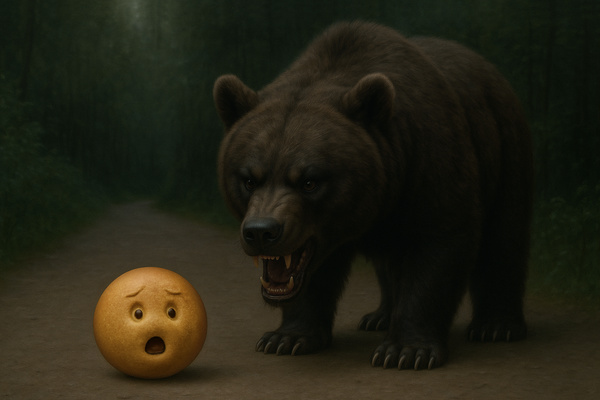
There once lived a granny with a grandpa, and they had no children. Thus, the granny decided to bake a little round loaf. She scraped together flour from all the nooks and baked a pretty, round bread product. She placed it on the table, covered it with a towel, and went off to milk the cows. From here the story becomes unclear, whether it was just the granny's hallucination from sniffing flour or if it reflects reality, but, according to the elders' testimony, the events unfolded like this...
The little loaf looked around and thought to itself: “The old woman will come back with the milk and eat me.” After all, he had just recently appeared and didn't realize that the granny and grandpa hadn't baked him for eating. At least that's what the old woman kept insisting to everyone — most likely trying to justify why he had run away from her. So then, the little loaf decided to set out on a journey. He rolled down from the table, through the door into the yard, then through the gate, and with momentum, rolled a bit more down the road before stopping. Smelling the tasty scent of fresh bread, a big bear came out of the forest and said:
— Little loaf, little loaf, I will eat you! — opened his mouth, the crust just crackled, and gobbled him up in one gulp.
And that was the end of the little loaf’s adventures. And what did you expect — that a round loaf of bread, without arms or legs, would roll far without a kick and be able to defend itself against a big bear? It's good that some crow or hare didn't find him lying there, otherwise, he would have suffered long while they were eating him.
The Witch’s Apples
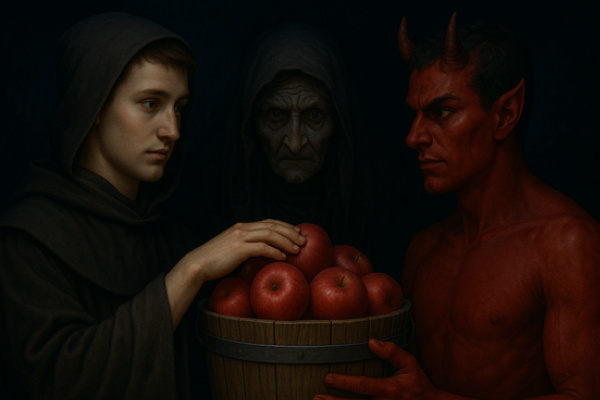
Once on the road, a young monk met a young devil and decided to determine who was more dashing and stronger. It's hard to say now whether they looked at each other the wrong way, or whether the conflict was determined by ideological differences. Both were young, so they began resolving it right there in the meadow through physical violence. They wrestled and grappled for a long time, but couldn’t defeat one another. The devil tried to stab the monk with his horns and strangle him with his tail, while the monk kept sticking his little cross everywhere, which blinded and burned the imp. Tired and worn out, with swollen faces and gaps in their collections of teeth, they decided that wrestling would not help and they needed to try something else. Then the monk said:
— Nearby lives a witch. She has orchards with apple trees reaching the sky. They’re covered with the finest apples. The orchard is fenced in with high fences and curses. Let’s agree, whoever first picks a bucket of apples — wins.
— All right, — agreed the devil, scratching the spots burned by crosses from his scalp to his behind.
The monk’s and the devil’s wrestling was even recorded in the local chronicle. It says that during confession, an anonymous person informed the priest that two suspicious young men had been rolling and grunting in a meadow for several days. The priest gathered the town’s men — some brought bundles of firewood, some whole logs on wagons, liquor and snacks — and with their wives and children went to restore local morality. In the fields, the crowd found only trampled grass. To at least compensate for the wasted time, they beat the anonymous man who had blackened the priest’s authority and, in doing so, lost his right to confession secrecy — then all went their separate ways.
No one in the land remembered where the witch came from. Near a dark forest stood a crooked hut and a large orchard, fenced with a tall barrier and thorny bushes. Birds flew around her land in a wide arc, and animals walked around it. Only rarely would villagers find the corpse of some stray beast near a broken part of the fence. Because of this, a settlement began forming nearby. People felt safe from wolves and bears of all kinds, which in other regions sometimes would snatch children and carry them off. The witch herself worked with herbs and didn’t speak the human tongue. In times of great trouble or illness, she would sometimes suddenly appear like a ghost and pull the suffering one from death’s jaws by pouring down strange brews. Everyone feared the witch and never dared to go borrow salt from her. Children were forbidden to approach, lest some misfortune happen to them like to those forest animals. Brave children would throw stones at her only from afar, and she would respond with incomprehensible shrieks and curses. Since the children didn’t fall ill from that, parents tolerated such behaviour from the witch. Only whispered thoughts arose that perhaps it would be better not to take risks — and to burn her down along with her hut.
The monk and devil immediately got to work. They tried climbing over the fence and digging underneath. From nearest treetops they tried flying over with self-made wings. Nothing helped. The witch would notice them instantly. She’d rush out of her hut with a broom and chase them like a mole after a worm. When she caught up, she’d snatch the apples and toss the empty bucket back over the fence. The devil with the monk barely carried out their hides. Then the witch would stand howling in rage and making signs. She’d point at the trees and the ground, wave a shovel and mime how she’d bury them. The monk and devil forgot their ideological dispute. They decided to exhaust the hag physically by taking turns. While one slept, the other kept her from closing her eyes.
After a week, the old woman was so worn out that not even the energetic herbs, she was clearly guzzling, helped. She collapsed from exhaustion in her hut’s doorway and began to snore. Then the monk and devil picked a full bucket of apples, pulled flasks of booze from their satchels and began enjoying themselves right there by the fence. Drunk, they sang until nightfall and shared their proudest memories of stealing those apples. They showed each other their bruises and welts from the broom with pride. Both agreed that setting aside ideological differences, more could be achieved together.
In the morning, the witch’s roaring woke the entire village. Villagers ran over and saw that the two had already been cursed. They lay dead, twisted in horrific poses with faces contorted by suffering. Nearby lay an empty bucket, drained bottles of alcohol, and apple cores. People understood that the two had provoked the witch themselves. But the horror and outrage over how she could kill such handsome young men was greater. Even though one of them had horns, hooves, and was entirely red, that only made him more appealing to the local women. They’d heard tales of aristocratic beasts in castles with talking teapots, who just needed to be fixed and have a ring slipped onto their claw. The villagers decided that patience had its limits. They seized the witch, stuffed one of her own apples into her mouth so she couldn’t curse, tied a stone to her neck, and drowned her right there in the lake.
Everyone breathed easier and decided to hold a festival celebrating liberation from darkness. Young and old took part. They danced, sang, drank beer and mead. Without fear, they dug up her gardens, trampled her witchy herbs, picked and ate apples from the trees, baked apple pies, made apple juice, pressed apple cheese. They shared with each other and the children. Even the pigs in their pens were treated. The forbidden orchard’s bounty was at last available to the whole world. Joy knew no bounds. The village elders declared that there was no need to fear witches — for they weren’t so scary after all. They also announced they would build a monument to the monk and the devil, and every year the village would gather for a witch-defeating and apple-eating festival. A festive mood filled the air, the sun shone. It seemed even the birds began to chirp.
People talked about that village for a long time, once the news spread about what had happened there. Word got out when a wandering traveller found it strewn with horribly mangled corpses and not a single living soul. A dispatched royal commission discovered that the mute and deaf granny was just a simple herbalist. She had tried to protect the locals from eating the apples, for they brought death with their poison. They found that a large part of the orchard had already been cut down. But she could not, on her own, overcome the rapidly growing giants. People turned their heads, why she kept it a secret and didn’t ask for help. But later, when the king had the trees dug up and taken away, and his adversaries, along with those who asked similar questions, began dropping like flies in every corner, they stopped actively showing interest.
The apples later resurfaced when the queen fed them to the king and tried to poison his daughter Snow White, who lived with seven dwarfs — but that is another story.
The Three Hazelnuts

In one kingdom, the king decided to host a feast and at it find a wife for his son. He summoned all the kingdom’s nobles to bring their daughters. In that kingdom also lived a simple merchant, who had a very beautiful and kind-hearted daughter. Upon hearing about the feast, the daughter decided to marry the prince and, without saying a word to her father, set off on foot for the journey.
One evening, while walking like that, she met a squirrel, thrashing in a hunter’s trap. She felt sorry for the poor squeaking creature and freed it from the trap. The squirrel immediately transformed into a forest enchantress and said:
— I test all the candidates this way. This is how I want to find out which are worthy of the prince and which are not. You are the first one who freed me. All the others indifferently passed by in their carriages or ordered me killed and my pelt skinned. For your kindness, I will give you three little nuts. When you find yourself in a hard situation and need help, think of a wish, crack the nut, and your wish will be fulfilled.
Arriving at the castle gates, the girl noticed that her clothes were poor, her hairstyle too, and she didn’t have a splendid carriage like the other ladies. She ran into the nearest bushes, pulled one little nut from her pocket, and said:
— Little nut, little nut, give me the most splendid carriage, so that the prince, having seen me from afar, would choose me.
As there was nothing at hand with which to crack the nut, she decided to bite it open. She bit and bit, until — pop! — her left-side teeth cracked, and the nut stayed whole. Gripped by pain and anger, she threw the nut into the grass.
Then she began thinking: “Maybe the wish was too big and I should lower my expectations.” She took out the second nut and said:
— Little nut, little nut, give me the most beautiful dress, so that the prince, having seen me from afar, would choose me.
She bit and bit, until — pop! — now her right-side teeth cracked, and again, nothing happened to the nut. Gripped by pain and frustration, she threw this nut into the grass too.
Then she again began thinking: “Maybe I expect too much from such a small nut and even my last wish was too big.” She pulled out the last nut and said:
— Little nut, little nut, give me the most graceful hairstyle, so that the prince, having seen me from afar, would choose me.
Her left and right sides already hurt, so she began biting with her front teeth. She bit and bit, until — pop! — all her front teeth cracked, and the nut didn’t even flinch. Clutching her mouth in pain, she even let out a scream, and threw away the last nut.
“So be it, there’s nowhere else to turn. I’ll go as I am,” she thought, and headed into the selection hall, where she stood among the other candidates. Since she was indescribably beautiful, the prince noticed her right away — without carriage, without a beautiful dress, without a hairstyle. He took her by the hand and they danced, and clung to each other that evening as much as etiquette permitted. The prince was only puzzled why she wasn’t speaking to him.
At the end of the evening, the king gathered everyone into the main hall and told them to form a circle around the prince. The court painter appeared and declared he would make a quick sketch for the royal archive and told everyone to smile. The merchant’s daughter, lost in dreams of her upcoming wedding, forgot herself and smiled. The king and his attendants saw her toothless mouth and became terribly frightened, thinking she was sick or didn’t brush her teeth, and he ordered her removed from the selection.
The girl returned home, saddened. The prince chose another woman as his wife. Later, it turned out the prince was a terrible womanizer, and that same year, during a conflict, he strangled his wife and threw her from a tower.
The forest enchantress later visited the merchant’s daughter and explained that she wanted to protect such a kind girl. And, so that in the future she wouldn’t fall victim to her own flawless beauty, she gave her metal nuts. The girl tried to beat the enchantress, but she turned into a squirrel and escaped through the open window.
After having her teeth fixed, the merchant’s daughter better understood how dangerous the world could be, and that even those who consider themselves enchantresses and claim to help might have squirrel brains.
By the way, in a parallel kingdom, the enchantress gave the merchant’s daughter actual magical nuts. She bit into them just the same with her teeth and died instantly with a carriage wheel in her throat.
The Magic Beans
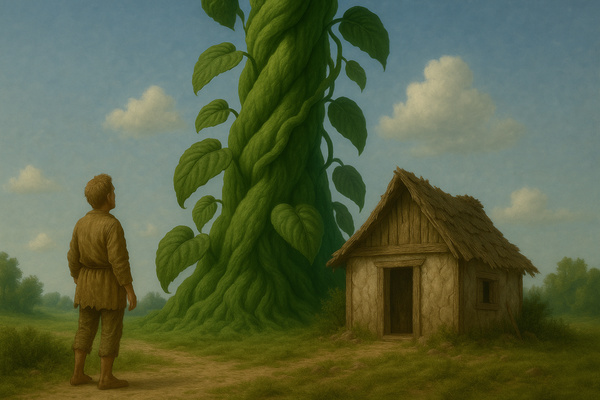
Once there lived a little man who was happy with what life had given him and didn’t tear himself apart for anything extra. One day, a strange merchant came to his homestead and said:
— Give me all your valuables, and in return I’ll give you magic beans.
He told stories about how they bring huge harvests, cure all illnesses, and even lay golden eggs. For those eggs, one only had to climb into the sky.
The little man had nothing, so he ransacked his neighbour’s house while the neighbour was away at the market. He bought the beans and, cheerful, buried them in the garden next to his house. Too lazy to fetch water from the well, he simply peed on the spot and went off to sleep.
In the morning, he gets up — and lo, the merchant hadn’t deceived him. A giant stalk, piercing the butt of the clouds, stood in the place where it was sown. The man looked up and thought: “Why should I climb into the sky to pick fruit or gather some eggs? The ripe ones will fall down on their own. And to water such a monstrosity — you’d never haul enough water for that.” So he went back to lie in bed again.
Unwatered, the bean quickly withered and collapsed onto the house, burying the little man beneath the rubble. And so the story ended — because he had no desire to strive for himself or for others, and had no motivation to develop the plot. But he could have indeed risen high.




